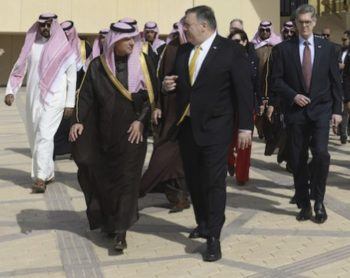Jonathan Guyer in American Prospect:
 Until the 1970s, Saudi Arabia was simply a docile U.S. ally and source of cheap oil. That began to change with the OPEC-engineered price hikes, masterminded by the Saudi government. The Saudi government then subsidized the spread of radically fundamentalist Islam through the Muslim world. The stakes increased with the attacks of 9/11 (the majority of the skyjackers were Saudi). But throughout this era, Washington continued to indulge Riyadh, either because of the politics of oil, plain conflicts of interest, the fact that the Saudi policy toward Israel was covertly not as hostile as it might have been, or all three. With the ascension of MBS, a newly bellicose kingdom has emerged. Saudi has reached out to allies in Asia who neglect human rights and are happy to displace U.S. influence. It has engaged in monstrous violations of diplomatic norms, of which the Khashoggi hit was only the most extreme case. The U.S.-Saudi relationship has at last reached the inescapable crisis that Washington has been dreading since 9/11.
Until the 1970s, Saudi Arabia was simply a docile U.S. ally and source of cheap oil. That began to change with the OPEC-engineered price hikes, masterminded by the Saudi government. The Saudi government then subsidized the spread of radically fundamentalist Islam through the Muslim world. The stakes increased with the attacks of 9/11 (the majority of the skyjackers were Saudi). But throughout this era, Washington continued to indulge Riyadh, either because of the politics of oil, plain conflicts of interest, the fact that the Saudi policy toward Israel was covertly not as hostile as it might have been, or all three. With the ascension of MBS, a newly bellicose kingdom has emerged. Saudi has reached out to allies in Asia who neglect human rights and are happy to displace U.S. influence. It has engaged in monstrous violations of diplomatic norms, of which the Khashoggi hit was only the most extreme case. The U.S.-Saudi relationship has at last reached the inescapable crisis that Washington has been dreading since 9/11.
But that said, what should our Saudi policy be, even assuming a competent government in the White House after 2020?
More here.
